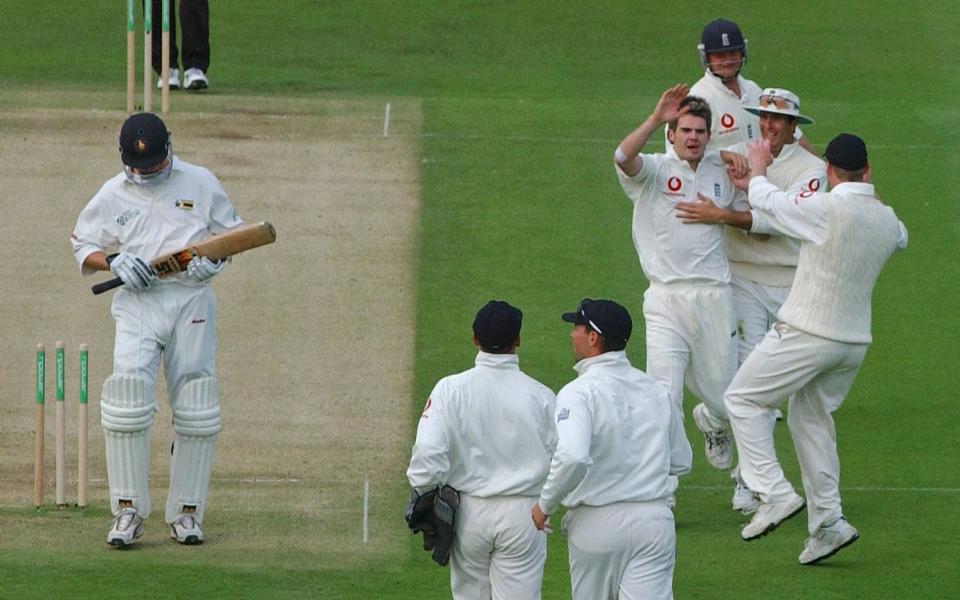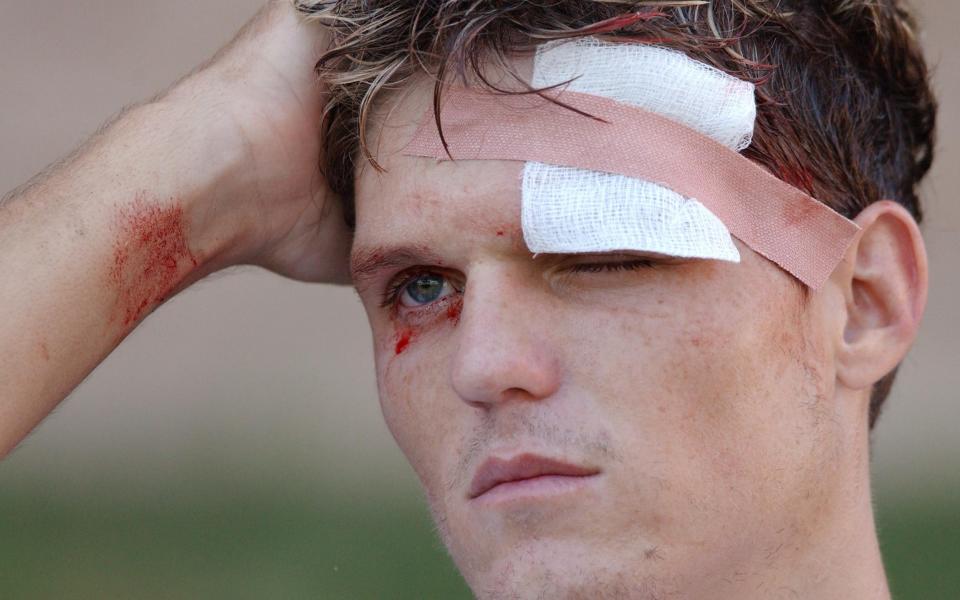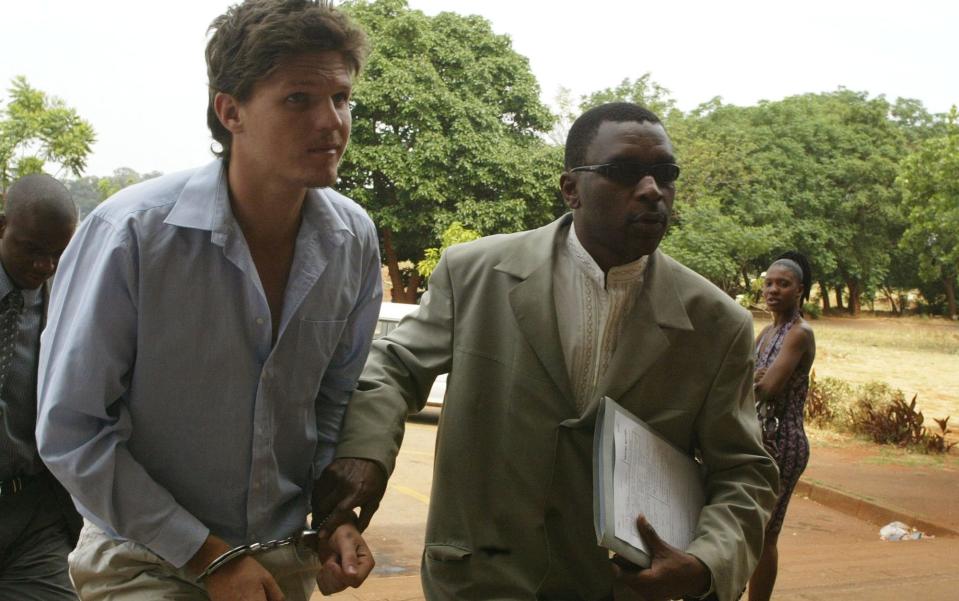‘I was James Anderson’s first Test wicket – but that was just start of wild journey’

“I still knock out 50 here and there, and I still enjoy it, except for the three to four days after the game, which is how long it takes to recover. So hats off to Jimmy Anderson to still be doing it past 40 as a fast bowler. I’m just a batsman who stands at slip for 50 overs. That’s painful enough, let alone a Test match.”
So says Mark Vermeulen down the line from Plettenberg Bay, one of the jewels of South Africa’s gorgeous Garden Route. At 45, he is still turning out for Plett Pioneers in the South Western Districts Premier League and coaches locally.
Twenty-one years ago, the Zimbabwean Vermeulen became Anderson’s first Test wicket. While Anderson’s story since has been largely linear – almost relentless wicket-taking – Vermeulen’s has been altogether less predictable, taking in an assortment of cricketing bans for everything from accosting spectators to racist social-media posts, a near-fatal blow to the head while batting, an attempt to storm the official residence of Robert Mugabe, burning down Zimbabwe Cricket buildings, contemplating taking his own life, and an unlikely return to Test cricket after more than a decade away.
For all that has happened since, Vermeulen may – via pub quiz questions and TV montages – be best remembered for being Anderson’s first scalp, who will look to claim a few more in his final Test at Lord’s next week.
‘The lunches at Lord’s were amazing’
“It was his first Test and my second, so no one could have predicted all these years later that’s what we’d be talking about, and it was the start of a famous story,” he smiles. “I’ve loved watching him bowl over the years, and in the modern game I can only think of Sachin Tendulkar going on so long, and batting is not nearly as taxing on the body.”
“Just to play at Lord’s was a dream come true,” he adds. “And the lunches were amazing. I was at slip, and I remember England had 450-odd on the board. [wicketkeeper] Tatenda Taibu said how tired he was getting, and I just said to him, take a moment to look around at where we are, all these people watching, how perfect the field is! We both agreed it doesn’t get much better than that.
“We hadn’t seen much of Jimmy, but he could swing the ball late and bowled with good pace. It was only my second Test as well, and in the first innings he bowled a good ball to get me. In the second I batted well to get to 60-odd, then Mark Butcher, the part-timer, swung one away and I nicked off to slip – I couldn’t believe it! However I did take a good catch to get Butcher diving at midwicket after he made a hundred. That was a cool moment, one of the highlights of my career.”
Soon after, Vermeulen started to find trouble. In the second Test at Chester-le-Street, he made a pair. Having played club cricket for Benwell and Walbottle CC in Newcastle, he told team management that he would be meeting some friends for a meal after the game, rather than catching the team bus. They agreed, before changing their mind.
“I thought that was ridiculous, so I went for the meal,” he explains. “The next day they sent me home because I didn’t come back on the bus. I asked for my passport, and went to play Lashings [the legends’ touring team] instead. I was with guys like Jimmy Adams and Richie Richardson, and I tell you – it was much better than getting whipped playing a tri-series for Zimbabwe! I also got paid more for Lashings.”

Earlier in 2003, Vermeulen had suffered his first worrying blow to the head while batting. In 2004, he was hit by India’s Irfan Pathan in Australia.
“The first blow was a fracture to the left side of my skull,” he says. “I adjusted my visor and this one crashed into the right side, and it was a brand new ball. There is 5-7mm between the skull and brain. My skull was fractured by 3-4mm. It could have been disastrous.
‘I said I loved cricket so much I don’t mind dying on the field’
“The doctor said I highly recommend you never walk on a cricket field again because if you are hit again you are going to be history. I said I loved cricket so much I don’t mind dying on the field. It was supposed to be out for four months, but I was back within two. At the beginning I couldn’t even put on a helmet because of the scar, so I was playing without a helmet. It was totally crazy.”
The blows, Vermeulen believes, contributed to increasingly erratic behaviour and mental health issues in the years that followed. He suffered from intermittent explosive disorder, so “I would get very pissed off very quickly”.
He was left out of a Zimbabwe squad following an incident in club cricket.
“There were two drunk guys talking rubbish in the crowd,” he says. “I threw the ball at them and it kicked off. I ended up getting tackled by the chairman of my club, who punched me in the head! It was a hectic day out.”
Following his omission, he tried – but failed – to burn down the Harare Sports Club. The next night, he succeeded in burning down the national academy.
“I thought that if they weren’t going to select me then no one should be allowed to play cricket, but I was losing the plot,” he says.

On another occasion, he knocked on President Mugabe’s door demanding an audience to discuss the decline in the national cricket team.
“I wanted to plead with him not to let politics affect sport,” he explains. “The team doing well can boost the morale of the country. I wanted it to be a positive thing, but I got blocked at the gate. They took me to the police station and asked all these questions, wrote it down and then handed him a letter. I never heard back.”
The arson episode resulted in a long criminal trial, at the end of which he was acquitted on the grounds of mental health due to the head injuries he had suffered playing cricket. “They did an EEG scan and found a misfiring in my left hemisphere and I was cleared,” he says.
Slowly, he was readmitted into Zimbabwean cricket, first domestically, then in the international game, including a solitary Test appearance in 2014. However, he would receive another ban a year later for making a racist comment on Facebook.
At his lowest moment, Vermeulen drove to Victoria Falls and was planning to take his own life, but did not. These days, Vermeulen has little to do with Zimbabwe or the country’s cricket team, whose performances he finds “disappointing”. But he has his mental health under control following plenty of medication and has found peace.
“I’m grateful that I never took it that far [suicide],” he says. “I was in the deepest depths.
“I am grateful that I was forgiven and made a comeback for Zimbabwe, once they realised the issues were caused by the impacts from cricket. To go full circle was nice, and to get through the traumas. Now, life is pretty cool, and I am very chuffed.”

 Yahoo Sport
Yahoo Sport 





































































